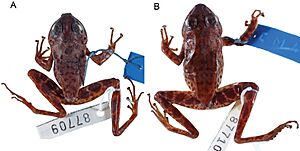Petropedetes johnstoni facts for kids
Quick facts for kids Petropedetes johnstoni |
|
|---|---|
 |
|
| Conservation status | |
| Scientific classification |
|
| Kingdom: | Animalia |
| Phylum: | Chordata |
| Class: | Amphibia |
| Order: | Anura |
| Family: | Petropedetidae |
| Genus: | Petropedetes |
| Species: |
P. johnstoni
|
| Binomial name | |
| Petropedetes johnstoni (Boulenger, 1888)
|
|
| Script error: The function "autoWithCaption" does not exist. | |
| Synonyms | |
|
|
Script error: No such module "Check for conflicting parameters".
The Johnston's water frog (scientific name: Petropedetes johnstoni) is a type of frog that belongs to the family Petropedetidae. This special frog is found only in the coastal areas of Cameroon, a country in Africa. It's known from only a few specific places there.
For a while, another frog called Petropedetes newtonii was thought to be the same species as Petropedetes johnstoni. This made people think Petropedetes johnstoni lived in many more places. However, scientists now know they are two different species. Because of this, we don't have a lot of information specifically about Petropedetes johnstoni on its own.
What's in a Name?
The second part of the frog's scientific name, johnstoni, is a way to honor Harry Johnston. He was a British explorer and a naturalist (someone who studies nature). He was the person who first collected the original frog specimen, called the holotype, that scientists used to describe this species.
Meet the Johnston's Water Frog
These frogs are not very big! Adult male Johnston's water frogs are about 32 mm (1.3 in) long from their snout (nose) to their vent (bottom). Adult females are a little larger, measuring about 38 mm (1.5 in).
Their snout is slightly rounded. They have a clear tympanum, which is like an eardrum, behind their eye. In males, this "eardrum" is smaller than their eye. They also have a distinct fold of skin, called a supratympanic fold, above the tympanum.
The tips of their fingers and toes are wider and flattened, like small discs. Their fingers do not have any webbing between them. Their toes might have a little bit of webbing. The skin on their back has small bumps, called warts. Unlike some other frogs, male Johnston's water frogs do not have very large forearms or rough, spiky skin on their throat and arms.
Home and How They Live
The Johnston's water frog lives in lowland forests and mangrove forests. These are forests that grow near the coast. Male frogs can make calls even when they are far from water. It seems that this frog species does not need water for its babies to develop. Scientists believe their larvae (young frogs) grow on land.
Male frogs are known to guard their eggs, which are laid in a nest on large leaves slightly above the ground. In the past, scientists worried about this frog's home being destroyed. This was happening because of farms being built, trees being cut down (logging), and more human settlements (towns and villages) growing. The Johnston's water frog has been found in the Korup National Park, which is a protected area.
 | Georgia Louise Harris Brown |
 | Julian Abele |
 | Norma Merrick Sklarek |
 | William Sidney Pittman |


